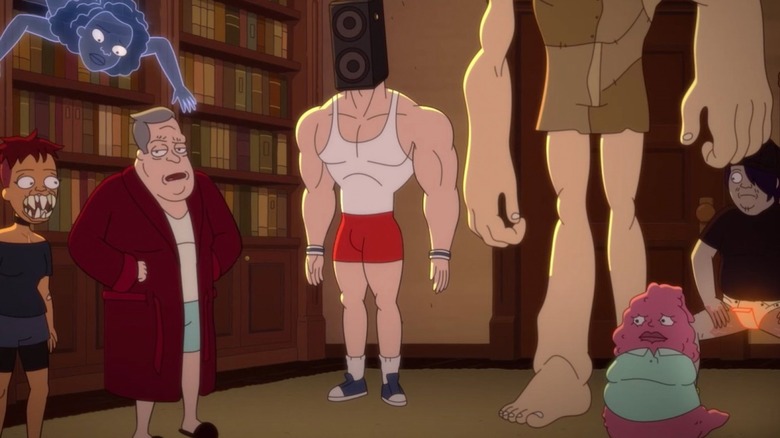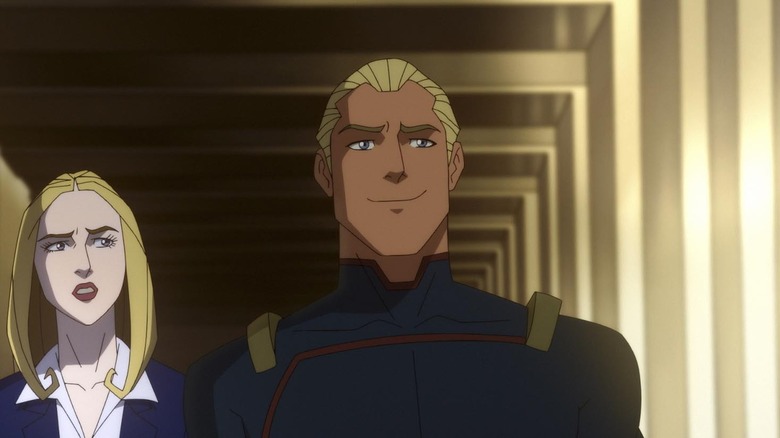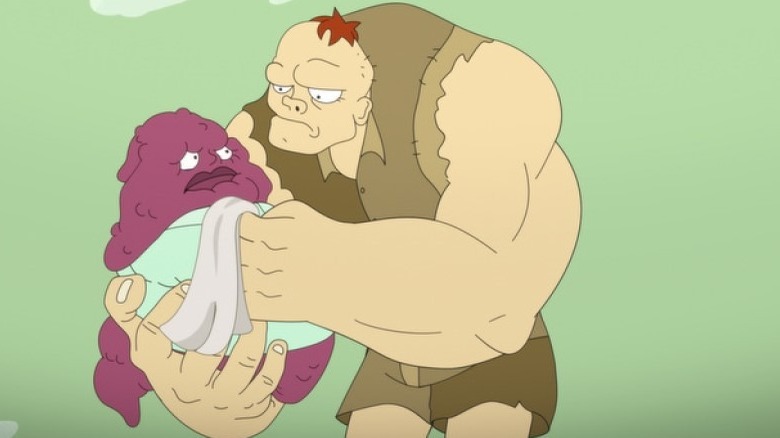How Diabolical Connects To The Boys Live-Action Series
"The Boys Presents: Diabolical" is a great example of the way "canon" limits the kind of stories that can be told. The show, an adult animated anthology set in the world of "The Boys," presents a variety of tales that explore the ramifications of a world of corporate superheroes, telling weird, gross, obscene, hilarious stories that are only kinda, sorta related to the main show.
One of the reasons "The Boys Presents: Diabolical" works so well is because it doesn't have to adhere to the rules or established events of the live-action show. The series doesn't even include the main characters from it. If it was forced to connect to the main show, we wouldn't have the brilliance of Andy Samberg's rather emotional episode, which the shows' creators consider their favorite.
Of course, in the era of interconnected cinematic universes, canon has become the most important word in the dictionary since it was used to decide which parts of the Bible were considered "real" or not. That is to say, not even animated anthologies are free of canon, and "The Boys Presents: Diabolical" is seemingly going to connect to the future of "The Boys" live-action series.
A very dark origin story
Showrunner Erik Kripke confirmed at least one episode of "The Boys Presents: Diabolical" is definitely canon, but that was not originally the plan. The very last episode of the series" tells the origin story of Homelander and how he went from optimistic superhero to cynical murderer. The episode, titled "One Plus One Equals Two," shows Homelander's debut as a superhero and as a sort of spiritual successor to Soldier Boy, the man tasked with leading the superhero world — no pressure!
What makes the episode so surprising is that it shows Homelander was actually a proper hero, at least for a second. He genuinely seems to want to help people, but he also has a very short temper and a lot of emotional scars due to a lifetime to being raised and trained in a lab, which makes him violent. In "One Plus One Equals Two," Homelander's first mission goes horribly wrong and he ends up killing a whole lot of people. It also presents the origin of Homelander and Black Noir's relationship, with the former initially despising his silent babysitter, then learning to trust him as a silent confidant.
In a recent interview, Kripke revealed that, while the original plan didn't specify that this episode would be canon, it ended up being so good they had no choice but to accept it as the truth of Homelander's origin. Kripke said:
"There is a certain amount of background setup of really understanding the relationship between Homelander and Black Noir and giving us a deeper understanding before Season 3."
While the live-action show has only teased a deeper bond between the two superheroes, comic book readers know there is a longer and darker history between the two. It remains to be seen if the live-action show will actually adapt that part of the story, but Kripke's comments seem to indicate we will see more of their relationship, regardless.
Perhaps most interesting is that this is not the only episode that may connect to The Boys. In that same interview, Kripke says there is another episode that could connect to the main show, and it rules.
Don't mess with superpowered teens
Kripke also teased that he episode "An Animated Short Where Pissed-Off Supes Kill Their Parents," co-written by "Solar Opposites" creator Justin Roiland, has an "unexpected tie-in" to season 3 of "The Boys." However, he adds that the episode "is not at all canon," which is interesting. He seems to use that word as to indicate whether an episode is considered to be part of the history of the live-action show, which is mostly another way of saying that audiences may have to watch "The Boys: Diabolical" or risk missing out.
The Roiland episode, as the title blatantly spoils, deals with a bunch of superpowered kids deciding to kill their parents. Though not necessarily the best episode of the bunch, it is still a blast to watch all the gross powers Roiland comes up with. More importantly, the episode actually does a lot to build on the world of "The Boys." In the episode, the kids decide to kill their parents after discovering they were abandoned as kids for having less-than-stellar powers. As we know from the live-action show, parents select to inject their kids with Compound V in the hopes of getting a superhero child who grows up rich and famous (not unlike the way some parents force their kids into the entertainment industry). Of course, not all powers are equal, and these kids get the short end of the stick, from having your entire body be just a tongue, to having breasts as eyes.
While Kripke's comments make it seem like we probably won't see any of the weird superheroes appear in the main show, it is not hard to imagine the general theme of the episode be replicated later on. "The Boys" already revealed to the world the existence of Compound V, and that is most certainly going to cause problems between kids and the parents that forced superpowers into them. As more and more people start seeing superheroes for the egocentric, murderous corporate shills they are (in the show, of course), we are likely to see more conflict between those who do not like their powers, and those who forcefully gave it to them.


